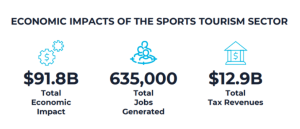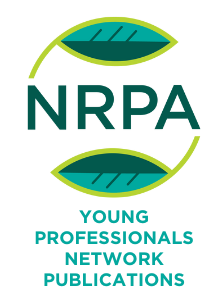
Sports tourism is a common term now, but it was largely unheard of until around 12 years ago. Sports tourism is a massive industry, and one of the fastest growing sectors in tourism according to the United World Tourism Agency. According to the Sports Events and Tourism Association (SETA), sports tourism generated over $90 billion dollars in economic impact across the U.S. in 2021. Sports tourism refers to travel for sporting events to either participate in or observe. Across the nation, sports tourism provides communities big and small millions of dollars in economic impact each year.

What are some of the first thoughts that come to mind when you think of sports tourism? On a large scale, an example of sports tourism would be the Super Bowl. Each year, the Super Bowl host city rakes in millions of dollars in extra spending from people from out of town. A large portion of the spending is from hotels, restaurants, ticket sales, and shopping due to the influx of tourists leading up to the week of the “Big Game”. Taxes from hotels, car rentals and hospitality all play a big part in the economic impact. With millions of dollars in spending coming from outside of the community, this is a big boost to local business owners.
On a much smaller scale, sports tourism is that weekend baseball tournament that brings in 50 teams to your town. No matter how big or small, those impacts make a difference.
Many times, especially when it comes to weekend tournaments, families bring along siblings and grandparents to watch their children compete all weekend long. For those small communities, this means big-time spending. This big spending has caught the attention of city officials and recreation professionals across the country, and now is the time to cash in.
By attracting visitors to your community, additional tax revenues are generated from hotel occupancy, food and beverage sales and hospitality services. In return, communities can keep taxes low for their residents and provide additional streams of income for city infrastructure improvements. Being that parks and recreation is subsidized by local taxes, the community often wants to see the benefit of their dollars at work. Oftentimes, sports infrastructure lies dormant on the weekends and gets very little use. Parks and city officials are now taking advantage of their community assets to generate additional streams of revenue.
Attracting high-profile tournaments can bring an influx of visitor spending into your community. See how Valdosta, Georgia, a community of around 56,000, has leveraged sports tourism to make an impact in their community. Hosting big events also brings publicity by raising the profile of the city and the potential for continued tourism. By working with local stakeholders, park and recreation departments are able to use these additional funds to help make facility improvements and provide a positive impact in their community.
In conclusion, sports tourism has a significant impact on the economic growth of cities across the globe. It creates job opportunities, increased tax revenue, boosts local businesses and attracts new businesses to the area.
Chandler Nobles, MS, CPRP (he/him) is an athletics supervisor at Valdosta-Lowndes County Parks and Recreation Authority.
This blog post was written in partnership with the NRPA Young Professionals Network (YPN). Learn more about the NRPA YPN on NRPA Connect or on the YPN Facebook group.


